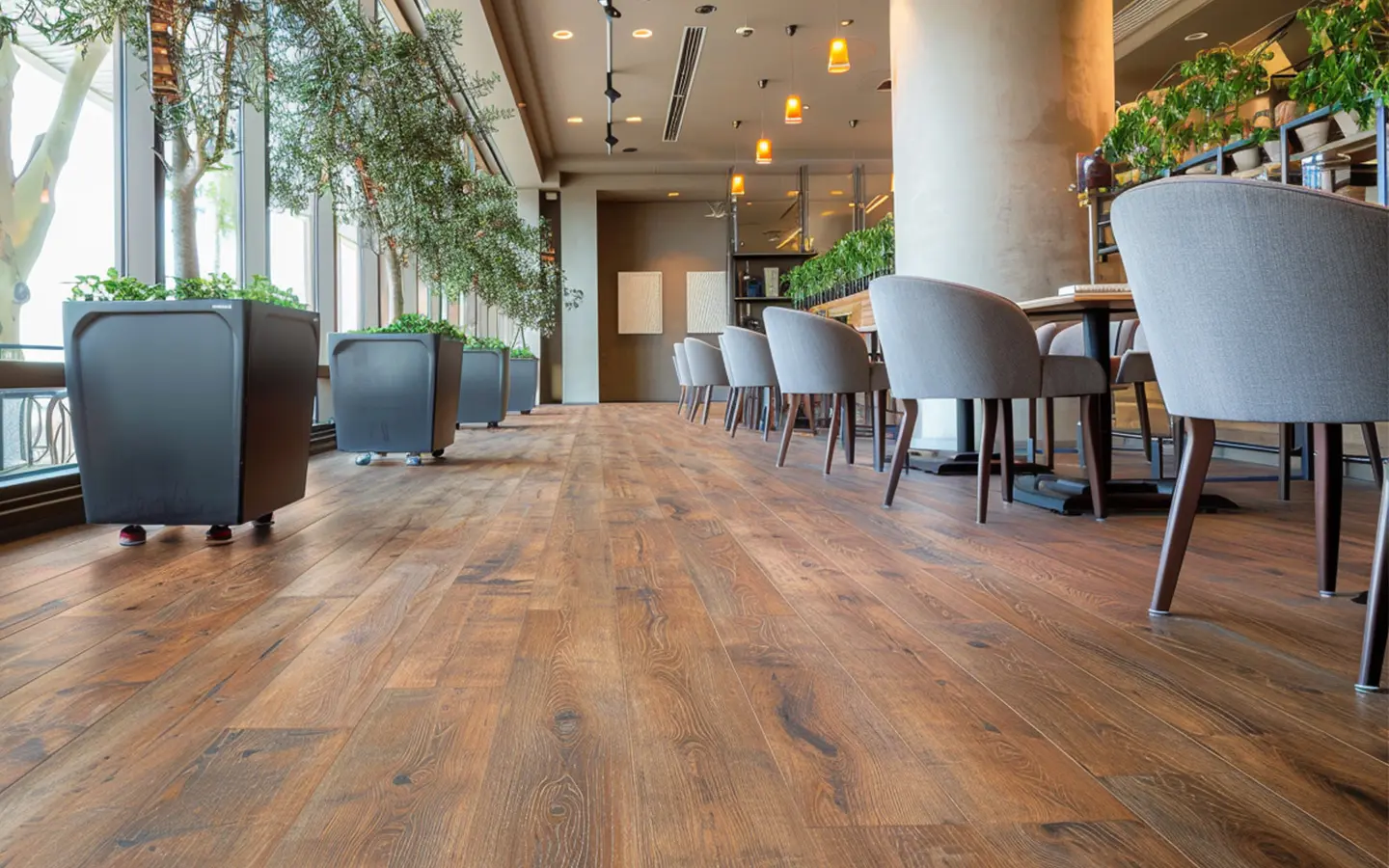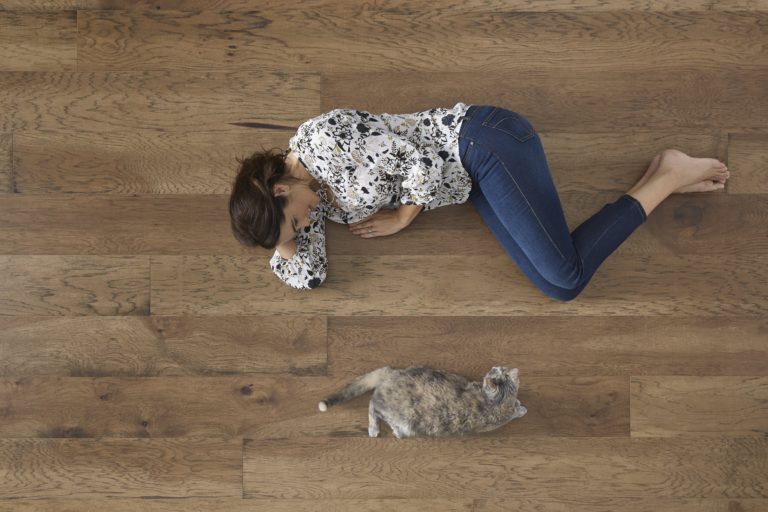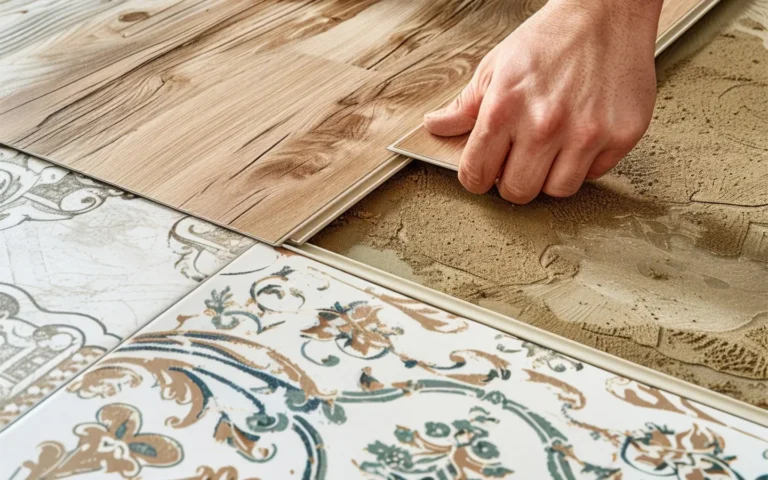When it comes to picking out the right flooring, it feels like everyone has something to say. From the latest trends to the most “revolutionary” materials, it’s easy to get lost in a sea of options and opinions. But here, we’re cutting through the noise and getting down to brass tacks about two solid contenders in the world of vinyl flooring: glue-down and floating vinyl planks.
Now, if you’ve wandered down the flooring aisle of your local home improvement store or lost a few hours scrolling online, you’ve probably noticed that vinyl has made quite a name for itself. And for good reason. It’s durable, versatile, and comes in an array of styles that can suit just about any taste. But once you’ve settled on vinyl, the real choice begins: to glue down or to float?
This isn’t about which one is “better” in some universal sense—because, honestly, there isn’t a one-size-fits-all answer. It’s about what’s right for your space, your lifestyle, and your budget.
In the following sections, we’ll walk through the ins and outs of both glue-down and floating vinyl plank flooring. We’ll talk about installation, durability, how they stand up to water, what they’ll cost you, and even how they feel underfoot.
Installation Costs
Sure, glue-down and floating vinyl flooring are both stars of the home improvement world, but what really sets them apart? Let’s cut through the sales pitches and get down to the nitty-gritty: installation hassle, bottom-line costs, and those little things the brochures don’t always mention.
DIY difficulty:
- Glue-Down Vinyl: Think of this like a large-scale, sticky jigsaw puzzle. Spreading that adhesive and getting those planks perfectly placed calls for either serious DIY experience or a trusted professional. If you hire someone, labor costs land somewhere between $1.50 to $3.00 per square foot.
- Floating Vinyl: This one plays nice with the DIY-inclined. Those planks click together effortlessly, making it a great weekend project for the handy homeowner. Pro installation is still an option, and you can expect it to be a bit easier on the wallet, around $1.00 to $2.00 per square foot.
Additional expenses:
- Glue-Down Vinyl: Plan on budgeting for some quality adhesive – that’ll run you about $0.30 to $0.60 per square foot. Plus, remember that subfloor needs to be flawless, as any imperfections will telegraph through your vinyl. Oh, and good news: no underlayment is needed with glue-down!
- Floating Vinyl: The planks themselves can cost a bit more, especially those fancy ones with built-in underlayment. If yours doesn’t have it, factor in that underlayment at roughly $0.30 to $0.75 per square foot. On the bright side, you get to skip buying glue.
Summing up the costs:
Let’s tally up the typical per-square-foot installation costs to get a clearer comparison:
- Glue-down vinyl: Labor Costs ($1.50 to $3.00) + Adhesive ($0.30 to $0.60) = $1.80 to $3.60 per square foot
- Floating vinyl: Labor Costs ($1.00 to $2.00) + Underlayment (if needed) ($0.30 to $0.75) = $1.30 to $2.75 per square foot.
Remember, these are just averages – material prices and labor costs can shift depending on where you live and how intricate your project is.
Durability and Ease of Repairs
Choosing new flooring is about more than good looks. You’re investing in a surface that will quite literally be the foundation of everyday life in your home. Spilled juice, muddy paws, maybe even the occasional gymnastics routine – your floors need to handle it all. Glue-down and floating vinyl plank flooring each offer distinct advantages when it comes to weathering the storms of daily life.
Glue-down vinyl: built to last
Picture glue-down planks like the rock-solid foundation of a house. Once they’re adhered to the subfloor, they’re not going anywhere. This gives them an edge in high-traffic areas of your home or in commercial settings where floors take a daily beating.
- Wear layer: Think of the wear layer as your vinyl’s armor. Glue-down options often boast thicker wear layers, making them more resistant to scuffs, scratches, and dents.
- Solid underfoot: Due to the firm bond with the subfloor, glue-down minimizes shifting and warping of the planks over time. This means a more consistent and stable feel underfoot.
- Built to last: Properly installed and maintained, glue-down vinyl can be a faithful companion for 20 years or more. It’s the kind of flooring that can see you through decades of home life.
Floating vinyl: practical and easy
Temperature changes can impact flooring, just as they do natural wood. The advantage of floating vinyl planks is their ability to expand and contract subtly in response to heat and cold. This resilience is very important in preventing the warping, buckling, or gaps that can compromise the look and safety of your floor.
If planks are glued down, they lose this flexibility; pressure from temperature shifts can force them to deform, creating an uneven and potentially hazardous surface
- Easier replacement: Since the planks are not adhered to the subfloor, installation is generally quicker and less messy. It also means that if a plank gets damaged or worn, you can replace just that piece without having to rip up large sections of your flooring. This makes maintenance easier and more cost-effective in the long run.
Best Brands of 2024
The verdict: needs vs. nice-to-haves
If unyielding durability is your top priority, especially in bustling areas, glue-down is your priority. It’s built to take a beating and stay beautiful.
For spaces where adaptability, easy replacement, and underfoot comfort are key, floating vinyl offers a practical and forgiving solution.
Waterproofing
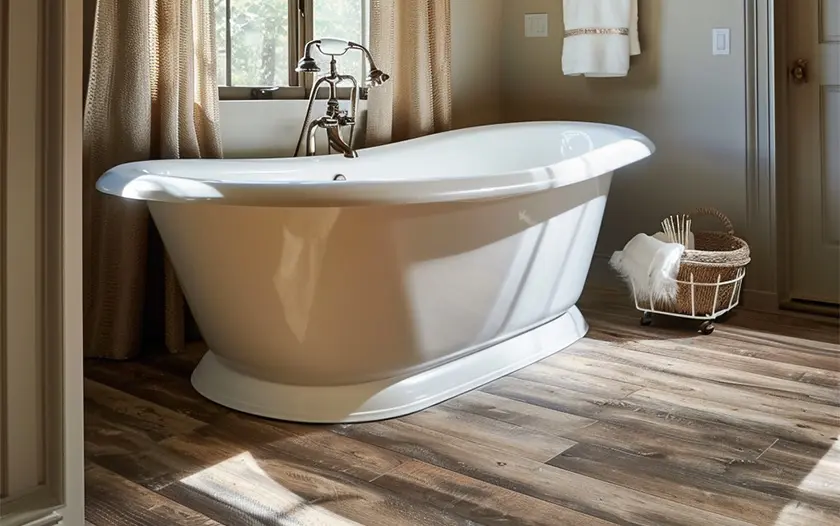
When battling moisture, the way your vinyl flooring is installed makes a subtle but important difference. Here’s the breakdown:
- Glue-Down: the watertight choice Think of glue-down vinyl as a moisture shield. It’s directly bonded to your subfloor, leaving no gaps for water to exploit. For the ultimate defense, use a moisture-resistant adhesive. Just remember, your subfloor needs to be in tip-top shape, or you risk those pesky moisture pockets. Glue-down is king for bathrooms, kitchens, and basements.
- Floating: convenience with caveats Floating vinyl is a DIY favorite thanks to easy installation and a comfy feel. It handles a spilled drink with ease, but prolonged exposure to water can eventually lead to water seeping in between the seams. Today’s tech offers tight-locking seams and water-resistant underlayments, making floating vinyl a solid contender for moderately moist spaces.
The verdict: In the fight against moisture damage, glue-down vinyl flooring is your most dependable choice. The tight seal it creates with the subfloor acts as a solid barrier against water, especially in high-moisture zones like bathrooms and basements.
Which One Feels and Sounds Better?
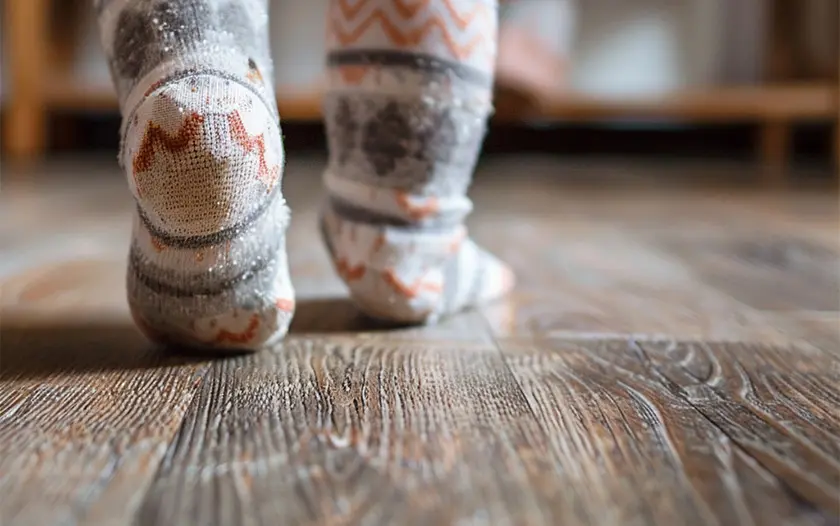
Looks aren’t everything! When picking your perfect floor, it’s vital to consider how it feels underfoot and the soundscape it creates. Let’s explore how glue-down and floating vinyl floors differ in these key areas, empowering you to make the best choice for your space.
Underfoot experience: how does it feel?
- Glue-down vinyl: This installation provides a solid, unwavering surface. It has benefits in high-traffic areas, but it might be less forgiving if you’re prone to standing for long periods. Think of it as a sturdy foundation, especially good under heavy furniture.
- Floating vinyl: These floors offer a subtle ‘give’ due to the space between the planks and the subfloor. This translates to greater comfort when walking or standing, especially in rooms like the kitchen, where you spend time on your feet. Plus, with floating installations, you have more freedom to choose thicker, cushier underlayments.
Acoustics: noise control
- Glue-down vinyl: Since it’s glued directly to the subfloor, sounds like footsteps tend to echo more noticeably. This might be a consideration in multi-story homes or busy areas.
- Floating vinyl: The layered construction and slight air gap inherent in floating vinyl help dampen noises. For reduced footsteps or a calmer soundscape, this type of flooring is a winner. Underlayments specifically designed for sound absorption can make it even quieter.
The bottom line:
If you want a floor with a slightly springy feel underfoot and excellent sound-dampening properties, floating vinyl is often the top contender. It’s a fantastic option for homes where coziness and a quieter environment are important. If a super-solid feel underfoot is most important, then glue-down might be the better fit.
Which One to Choose
The fight for the best flooring comes down to your needs. If you need a super-solid feel and high moisture resistance and are prepared for more complex installation, glue-down vinyl might be your hero. It excels in busy or wet areas.
But if you want DIY-friendliness, comfort underfoot, and easier repairs, floating vinyl could be the winner. Be mindful of moisture-prone areas, but for many homes, its comfort and ease of installation make it a favorite.
The best choice is the one that fits your space and your life!
About The Author

Brit Yeager
March 9, 2024
Brit Yeager is a freelance writer with a degree in News-Editorial Journalism with an emphasis in English Literature from the University of Colorado at Boulder. She previously worked for the Yoga Journal magazine, primarily writing the beauty and style pages, and is working on her first novel.
